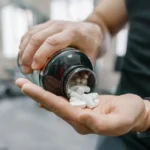Apple cider vinegar, or ACV, has been used for centuries for its health and wellness benefits, cooking uses, and even cleaning uses. But apple cider vinegar, like all good things, may not last forever.
It is important to understand the factors that influence apple cider vinegar’s shelf life, and we will answer the question “Does apple cider vinegar go bad?”. Whether you’re a health-conscious individual or a culinary enthusiast, you’ll want to grasp the nuances of storing this pantry necessity to ensure you’re reaping its full benefits.
Contents
Apple Cider Vinegar: What You Need to Know
We need to know a little more about apple cider vinegar before we can discuss its shelf life. It is a vinegar made by fermenting apples’ sugars. In this process, acetic acid is produced, which gives apple cider vinegar its distinct tart flavor. Many health benefits have been attributed to it.
The importance of storage and shelf life
The way you store apple cider vinegar has a direct impact on its shelf life, potency, and spoilage prevention. ACV has its optimal taste and nutritional value when it’s fresh. As apple cider vinegar is increasingly being used in wellness and culinary practices, it’s more important than ever that we preserve it properly.
Apple Cider Vinegar Duration
It is possible to store apple cider vinegar for a long period of time. Even when opened, a good-quality bottle can last for up to five years. We will now explore a few factors that influence its shelf life.
Aspects affecting shelf life
It is important to consider several variables when considering the shelf life of ACV, including the quality of the ingredients, the packaging, and the storage conditions.
Ingredient quality
High-quality, well-made ACV can last a few more years in your pantry than less meticulously crafted varieties depending on the type of apples used and the fermentation process.
The packaging
Choosing the right bottle for vinegar is crucial. Glass is often preferred because of its airtight qualities. With oxygen present, vinegar will oxidize and spoil more quickly.
Conditions of storage
If you want your vinegar to last, keep it away from heat and sunlight. It needs to be cool and dark to do that, which means you should keep it away from the stove and windows.
Vinegar signs of spoilage
Even though the shelf life of ACV is quite long, it is still important to recognize when it has gone bad. Signs of flawed ACV include changes in appearance, smell, or taste.
Changes in appearance
It is very important that you do not notice any cloudiness or sediments in the ACV. This is a telltale sign of spoiled vinegar. High-quality vinegar should always be clear and not cloudy.
Changes in aroma
The intensity of vinegar smell can be a sign of spoilage. It might be more pungent than usual, and it might even have a hint of rot, so it is likely that the vinegar should be discarded.
Testing the taste
If the product seems vinegary, but also has off-flavors, then it may be spoiled. You can determine whether or not it is spoiled by tasting a small amount.
Benefits of Fresh Apple Cider Vinegar
It’s important to ensure that your pantry is stocked with quality ACV, as well as ensuring its health-boosting and culinary properties.
Fresh ACV Health Benefits
The health benefits of apple cider vinegar include assisting digestion, reducing weight, and regulating blood sugar levels. ACV retains live, beneficial bacteria, including the “mother” — an acetic acid bacteria and acetic acid mixture when it’s freshly made and stored correctly.
Culinary Uses of Fresh ACV
A variety of uses for apple cider vinegar in cooking exist. Fresh and flavorful vinegar can elevate any dish’s taste and provide cooking chemistry benefits, which include tenderizing meats and energizing baked goods.
Apple Cider Vinegar: How to Preserve Its Quality
As you understand the shelf life and signs of spoiled ACV, you may wonder how to store it properly to maximize its lifespan.
Tips for storing apple cider vinegar
Here are the key storage practices to adopt:
- Keep in a cool, dark place for maximum freshness.
- Ensure the bottle is tightly sealed after each use.
- Avoid storing it in the fridge, as the cold can lead to condensation inside the bottle, which is a breeding ground for bacteria.
Maintaining quality
In addition to proper storage, how you handle vinegar can affect quality:
- Use clean, dry utensils and avoid cross-contamination to avoid harmful bacteria.
- Don’t transfer it to a different container unless it’s a clean, sanitized bottle designed for food storage.
- Keep the storage area free from dust and other contaminants that might enter the bottle.
Final Words : Does Apple Cider Vinegar Go Bad
It is more than a culinary ingredient for health and wellness enthusiasts; it is a lifestyle. It is important to store vinegar correctly in order to ensure it doesn’t spoil and that you reap all of its benefits. To keep your ACV supply tangy, follow these storage tips and keep an eye out for spoilage signs.
If you store apple cider vinegar properly, you’re not just extending its shelf life, but also preserving nature’s goodness. Next time you reach for a bottle of apple cider vinegar, remember the steps you’ve learned and enjoy its full potential.
The versatility and health benefits of ACV don’t end with a trip to the compost bin. In fact, it can be a staple in your kitchen for years, enriching your life.
- 10 Negative Side Effects Of Portobello Mushrooms – The Double Edged Delicacy
- 7 Critical Signs Your Liver Is Dying You Can’t Ignore
- A Comprehensive Guide Of L Carnitine Injections
- A Comprehensive Guide To Crystals For Weight Loss
- A Comprehensive Guide To Understanding And Preventing Friction Burns On The Penis: Tips For Healthy Intimacy
- A Guide To Botox And Surgery For Youthful Eyes











